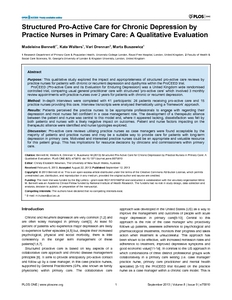Bennett, M; Walters, K; Drennan, V; Buszewicz, M
(2013)
Structured Pro-Active Care for Chronic Depression by Practice Nurses in Primary Care: A Qualitative Evaluation.
PLOS ONE, 8 (9).
e75810 (1) - e75810 (8).
ISSN 1932-6203
https://doi.org/10.1371/journal.pone.0075810
SGUL Authors: Drennan, Vari MacDougal
![[img]](https://openaccess.sgul.ac.uk/107044/1.hassmallThumbnailVersion/pone.0075810.pdf)  Preview |
|
["document_typename_application/pdf; charset=binary" not defined]
Published Version
Download (180kB)
| Preview
|
Abstract
Purpose: This qualitative study explored the impact and appropriateness of structured pro-active care reviews by
practice nurses for patients with chronic or recurrent depression and dysthymia within the ProCEED trial.
ProCEED (Pro-active Care and its Evaluation for Enduring Depression) was a United Kingdom wide randomised
controlled trial, comparing usual general practitioner care with structured ‘pro-active care’ which involved 3 monthly
review appointments with practice nurses over 2 years for patients with chronic or recurrent depression.
Method: In-depth interviews were completed with 41 participants: 26 patients receiving pro-active care and 15
practice nurses providing this care. Interview transcripts were analysed thematically using a ‘framework’ approach.
Results: Patients perceived the practice nurses to be appropriate professionals to engage with regarding their
depression and most nurses felt confident in a case management role. The development of a therapeutic alliance
between the patient and nurse was central to this model and, where it appeared lacking, dissatisfaction was felt by
both patients and nurses with a likely negative impact on outcomes. Patient and nurse factors impacting on the
therapeutic alliance were identified and nurse typologies explored.
Discussion: Pro-active care reviews utilising practice nurses as case managers were found acceptable by the
majority of patients and practice nurses and may be a suitable way to provide care for patients with long-term
depression in primary care. Motivated and interested practice nurses could be an appropriate and valuable resource for this patient group. This has implications for resource decisions by clinicians and commissioners within primary care.
| Item Type: |
Article
|
| Additional Information: |
Copyright: 2013 Bennett et al. This is an open-access article distributed under the terms of the Creative Commons Attribution License, which permits unrestricted use, distribution, and reproduction in any medium, provided the original author and source are credited. |
| Keywords: |
Adult, Aged, Depression, Female, Humans, Male, Middle Aged, Nurse Practitioners, Primary Health Care, Qualitative Research, Questionnaires, Risk Factors, Science & Technology, Multidisciplinary Sciences, Science & Technology - Other Topics, MULTIDISCIPLINARY SCIENCES, COLLABORATIVE CARE, ATTITUDE QUESTIONNAIRE, PATIENTS PERCEPTIONS, GENERAL-PRACTICE, MANAGEMENT, METAANALYSIS, DISORDERS, General Science & Technology, MD Multidisciplinary |
| Journal or Publication Title: |
PLOS ONE |
| ISSN: |
1932-6203 |
| Related URLs: |
|
| Dates: |
| Date | Event |
|---|
| 12 September 2013 | Published |
|
| Web of Science ID: |
WOS:000326240100129 |
| URI: |
https://openaccess.sgul.ac.uk/id/eprint/107044 |
| Publisher's version: |
https://doi.org/10.1371/journal.pone.0075810 |
Statistics
Item downloaded times since 10 Feb 2015.
Actions (login required)
 |
Edit Item |


